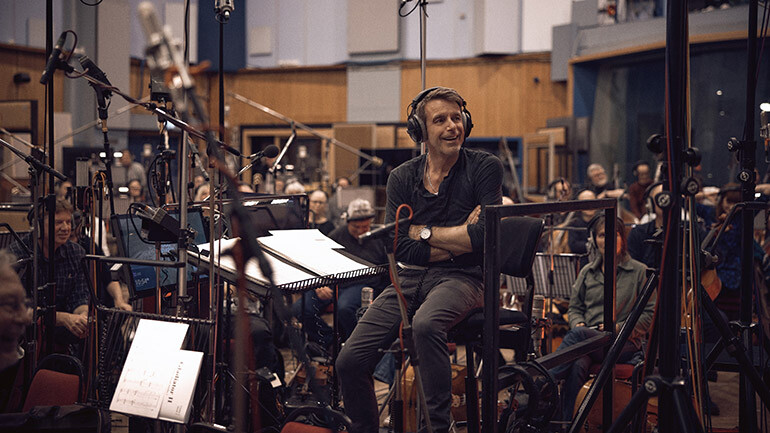Composer Harry Gregson-Williams on Scoring Gladiator II

An accomplished conductor, orchestrator, producer and composer for film, television and video games and a life-long music creator, Harry Gregson-Williams has amassed a body of creative work that is as rich as it is varied. Beginning his formal studies in music at the age of 7 at St. John’s College School in Cambridge, England, Gregson-Williams’ dedication to making music can be heard throughout his many scores, from his stirring themes for films like Spy Game, Man on Fire, The Martian, Catch-22, Sinbad: Legend of the Seven Seas, through his music for beloved franchises like the Narnia series, Shrek, Chicken Run, and many more. He has brought popular video games like Metal Gear to an entirely new musical level and worked with a host of celebrated directors like Ridley Scott, Tony Scott, Ben Affleck and Joel Schumacher, to name a few. For his incredible contributions to the world of music, Harry Gregson-Williams was recognized as a BMI Icon at the 2018 BMI London Awards.
Gregson-Williams’s most recent project is Ridley Scott’s long-awaited Gladiator II, the sequel to his epic from 2000. Having worked with Gregson-Williams on films like Kingdom of Heaven, The Martian, The Last Duel and House of Gucci, Scott knew he could rely on Gregson-Williams’s talents for a score suitable of this sweeping saga. On the eve of the film’s release, BMI caught up with the composer to discuss the experience. Here’s what he had to say.
You’ve worked with Ridley Scott on a number of films, including The Martian, The Last Duel, and House of Gucci. How did this project come about?
Ridley and I have done many films together. That said, I never take for granted a call from any director, although I always hope for another opportunity to work with Ridley. When the phone rang in June 2023, it actually came as quite a surprise, and my immediate concern was doing the original film and score justice. After that call, I reached out to Hans [Zimmer] and checked with him that he was okay with me doing the film, and to his credit he was fully supportive. He told me I was probably the best person for the job, and to put my anxieties aside and just get down to it.
Creating the world of ancient Rome is a massive undertaking. What was your approach to the score?
Beyond the large orchestra and choirs that an epic like this calls for, I knew the score would also require unique instrumentation to help shape the storytelling. As I’ve done on previous scores, I felt that before committing to any thematic material, it might be inspirational to gather a distinctive, diverse template of sounds - varied instrumentation and vocals. I hoped that by making the score as colorful and sonically interesting as possible, it would be my best way into that world.
The score incorporates instrumentation and musicians from around the world. What inspired you to take such a global approach to the music?
Quite early on I proposed to Paramount that rather than record remotely from my studio in Santa Monica, we do a trip to Spain to record a few vital instrumentalists. Among them, I recorded Abraham Cupiero-Lopez, a specialist in ancient war horns, and my old friend Martin Tillman the electric cellist. Abraham’s playing of the ancient war horn, the carnyx, was particularly inspiring during the Roman invasion scene at the beginning of the film. That scene as it existed in the early cut was 15 minutes long, so I had plenty of material for those people to play on.
There is more than 100 minutes of score in the film, which you recorded at the legendary Abbey Road Studios with a orchestra, the leading independent UK chorus The Bach Choir, and the internationally renowned Viol Consort Fretwork. Can you give us insight into your overall scoring process? How did you approach the themes for the film?
The action sequences are fairly grand in scale and needed a lot of punch from the music. I was fortunate to be able to record a huge orchestra and choir at Abbey Road to be the basis of the sonic template of this score. It needed to bring the right amount of gravitas. My palette included some wonderful vocalists, as well as the Bach Choir in London, which as you may know, is enormous. There are over a hundred people in the choir. Coloring that massive palette were the crucial individual contributions from a handful of vocal soloists. I didn’t see any reason why Lisa Gerrard wouldn’t be a really positive influence on the score, as she had been in the first movie. I called her, and she was touring with Hans but found time to record for me remotely. I also found a very interesting musician who on the surface is a singer-songwriter from Australia named Lior Attar; his voice brought an incredibly unique and arresting quality to the film.
Gladiator II is released in theaters on November 22.






Community
Connect with BMI & Professional Songwriters